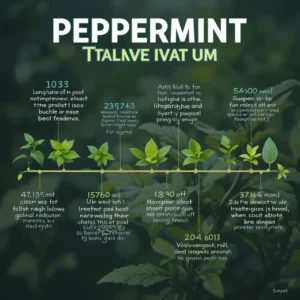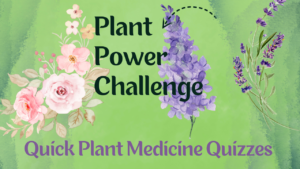Introduction
Peppermint is more than just a refreshing herb—it’s a natural remedy packed with health benefits, from soothing digestion to enhancing mental clarity. Whether enjoyed as a warm cup of tea, a refreshing essential oil, or a cooling balm, peppermint has been used for centuries as a powerful natural healer.
But what makes peppermint so special? This herb is packed with menthol, antioxidants, and anti-inflammatory compounds that help improve digestion, relieve pain, boost mental focus, and even support skin and hair health. In this guide, we’ll explore the history, benefits, and practical ways to incorporate peppermint into your daily life. By the end, you’ll see why peppermint is a must-have in any natural health routine.
1. The Origins and History of Peppermint
1.1 The Ancient Use of Peppermint
Peppermint has been cherished for thousands of years, with records dating back to Ancient Egypt, Greece, and Rome. The Egyptians used it in herbal medicine and even placed dried peppermint leaves in tombs as part of burial rituals.
💡 Did You Know? Archaeologists discovered dried peppermint leaves in Egyptian pyramids dating back to 1,000 BC!
1.2 How Peppermint Became a Household Remedy
Over time, peppermint spread across Europe and Asia, where it became a household staple used for teas, balms, and oils. People relied on peppermint to ease stomach aches, freshen breath, and cool feverish skin.
1.3 The Science Behind Peppermint’s Healing Powers
Modern research has uncovered the science behind peppermint’s benefits. The key active compound, menthol, provides cooling, anti-inflammatory, and pain-relieving properties that make peppermint so effective.
📌 Scientific Study: A study published in Phytotherapy Research found that peppermint oil can help relax muscles in the digestive tract, relieving symptoms of bloating and discomfort.

2. Peppermint and Digestive Health
2.1 How Peppermint Aids Digestion
One of peppermint’s most famous benefits is its ability to support healthy digestion. It helps by:
✔ Reducing bloating and gas
✔ Soothing indigestion and nausea
✔ Easing symptoms of irritable bowel syndrome (IBS)
📌 Scientific Study: A study in The Journal of Gastroenterology found that 75% of IBS patients who took peppermint oil capsules experienced symptom relief.
✔ Try This: Drink a warm cup of peppermint tea after meals to aid digestion.
3. Natural Pain Relief with Peppermint
3.1 Peppermint for Headaches and Migraines
If you suffer from frequent headaches or migraines, peppermint can be a natural, effective solution.
✔ Menthol relaxes muscles and improves circulation
✔ Applying diluted peppermint oil to the temples can relieve tension headaches
📌 Scientific Study: A study in Frontiers in Neurology found that peppermint oil was as effective as over-the-counter headache medications.
✔ Try This: Apply diluted peppermint oil to your temples and inhale deeply for quick relief.
3.2 The Cooling Effect: Peppermint for Muscle and Joint Pain
Peppermint’s natural cooling effect makes it an excellent choice for soothing sore muscles and joints.
✔ Eases muscle soreness after workouts
✔ Reduces inflammation from arthritis
✔ Relieves menstrual cramps naturally
✔ Try This: Mix peppermint oil with coconut oil and massage it into sore muscles.
4. Peppermint for Respiratory Health and Congestion Relief

4.1 How Peppermint Helps Open Airways
The menthol in peppermint acts as a powerful decongestant, helping to clear nasal passages and improve breathing.
✔ Breaks up mucus and reduces sinus inflammation
✔ Eases breathing for colds, flu, and allergies
✔ Try This: Add a few drops of peppermint oil to hot water and inhale the steam for instant relief.

5. Peppermint’s Impact on Mental Focus and Energy
5.1 Boosting Mental Clarity and Alertness
Feeling sluggish or struggling with focus? Peppermint can help sharpen your mind and improve concentration.
✔ Enhances cognitive function and memory
✔ Reduces mental fatigue and stress
✔ Provides an energy boost without caffeine
📌 Scientific Study: A study in Psychopharmacology found that inhaling peppermint oil increased alertness and cognitive performance.
✔ Try This: Diffuse peppermint oil in your workspace for better focus.

6. Peppermint for Skin and Hair Health
✔ Treats acne and soothes skin irritation
✔ Reduces dandruff and scalp dryness
✔ Stimulates hair growth
✔ Try This: Add a few drops of peppermint oil to your shampoo for a cooling scalp treatment.

7. How to Use Peppermint in Your Daily Life
✔ Make a peppermint room spray for a fresh-smelling home.
✔ Use peppermint lip balm for chapped lips.
✔ Add fresh peppermint to smoothies, teas, and desserts.
8. Potential Side Effects and Precautions of Using Peppermint
✔ Avoid peppermint if you have acid reflux (GERD).
✔ Always dilute peppermint oil before applying it to the skin.
✔ Consult a doctor if pregnant or on medication.
9. FAQs About Peppermint
❓ Can I apply peppermint oil directly to my skin?
✔ Only if diluted with a carrier oil.
❓ How often can I drink peppermint tea?
✔ Up to 2–3 cups per day.
❓ Is peppermint safe for children?
✔ Use caution—peppermint oil is too strong for babies.
❓ Can peppermint help with bloating?
✔ Yes! It’s great for digestion.
10. Why Peppermint Deserves a Place in Your Wellness Routine
Peppermint is more than just a refreshing herb—it’s a natural powerhouse for digestion, pain relief, mental clarity, and respiratory health. Whether used in teas, essential oils, or skincare, peppermint offers countless ways to support overall well-being.
💚 Try adding peppermint to your routine and experience its refreshing benefits today!


0 Comments